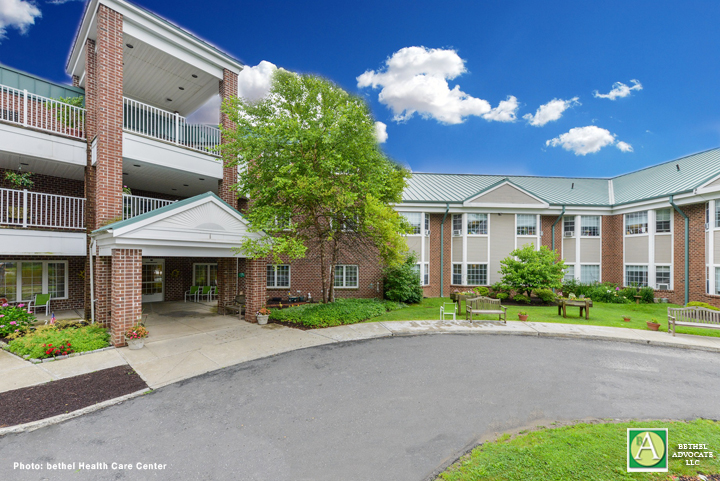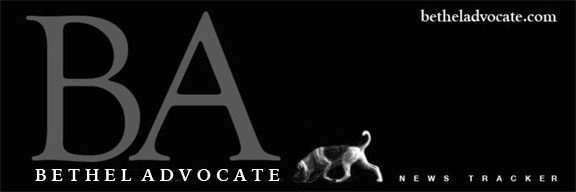
Report by Paula Antolini, May 21, 2020, 7:30AM EDT

A report by the Connecticut Department of Public Health shows 20 Connecticut health care facilities with deficiencies, including Bethel Health and Rehabilitation Center located at 13 Parklawn Drive, Bethel, CT.
“A COVID-19 Focused Survey was conducted on 4/20/2020 at Bethel Health and Rehabilitation Center to determine compliance with 42 CFR Part 483 Requirements for Long Term Care Facilities, including proper infection prevention and control practices to prevent the development and transmission of COVID-19,” the report states.
The report states rules and regulations which Bethel Health Care failed to follow. The report concludes, “This REQUIREMENT is not met as evidenced by: Based on observations, review of facility policy, and interviews, for two of two staff members reviewed for infection control, the facility failed to ensure the proper use of PPE when providing care to residents with known positive for COVID-19 and then residents who were identified as negative.”
Some of the deficiencies were:
—The facility failed to ensure the proper use of PPE when providing care to residents with known positive for COVID-19 and then residents who were identified as negative.
—It was observed that a Nurse Aide was exiting a resident room who was a known positive for COVID-19 donning a disposable short sleeve rain poncho over a disposable paper isolation gown. NA #1 proceeded into the hallway of the unit.
—It was observed that an employee is supplied with the rain poncho and a disposable paper isolation gown at the start of his/her shift and instructed to leave both the poncho and gown on until he/she completes the shift. He/she disposes of the paper isolation gown and the rain poncho is sprayed with a disinfectant and left to dry for his/her next shift. He/she does not remove the disposable rain poncho nor the disposable isolation gown when he/she enters or provides care to the two residents who are not confirmed positives for COVID-19.
—It was observed that staff are not doffing gowns or ponchos after caring for a positive resident and entering a negative resident room per policy.
buy Doxycycline online Doxycycline no prescription cheap Doxycycline generic
—It was observed that all units now have residents who are confirmed positive, presumed positive, negative, and presumed negative due to the absence of signs and symptoms of COVID-19.
—It was observed that an employee was in fact working on a unit where two residents are presumed negative although exposed to COVID-19.
—The DNS identified the staff are to wear the disposable gowns and rain poncho for their entire shift and are not to remove them when providing care to any resident per the facility policy.
—It was observed that the extended use of disposable isolation gowns is worn by the same staff when interacting with more than one patient known to be infected with the infectious disease.
—It was observed that employees are required to wear the gown for their entire shift.
More information can be found HERE.
Read the governor’s message and details of the report below.
*****
Governor Ned Lamont’s message:
The Connecticut Department of Public Health reports findings of deficiency in infection control in nursing homes.
buy Finasteride online Finasteride no prescription cheap Finasteride generic
On May 20, 2020, the Connecticut Department of Public Health (DPH) posted online findings of deficiency in 20 additional nursing homes. The findings relate to infection control and were made following focused infection control surveys of all 213 nursing homes in Connecticut that were conducted in partnership with the Connecticut National Guard and inspectors from the federal Centers for Disease Control and Prevention. These involved unannounced, in-person visits to nursing homes and have also resulted in enhanced staff training and additional deliveries of personal protective equipment (PPE). A key infection control procedure cited in four of the deficiency findings is cohorting, which refers to housing or grouping together nursing home residents tested positive for COVID-19 (or any other infectious disease) in order to slow down the spread of a viral infection.
There were two deficiency findings for improper notification inside the facility and to families, three findings based on improper physical distancing between residents, four findings of various other infection control problems, and 11 findings related to improper use or cleaning of PPE.
By law, the facilities have time to review and potentially dispute the findings of deficiency, and must come up with a plan of corrective action that is approved by DPH. Once the plans of correction are approved, the findings can be posted online. Since visitation to any skilled nursing facility has been banned during the course of the pandemic, DPH has posted these findings publicly online through Connecticut’s e-license website.
To view the recent findings of deficiency and corrective plans of action for individual nursing homes, search the e-license website for nursing home inspection documents that were filed between April 1, 2020 and the current date.
*****
A MORE DETAILED REPORT:
The information includes reports by the Department of Health and Human Services Centers for Medicare & Medicaid Services, about Bethel Health Care Center, 13 Parklawn Drive, Bethel, CT, and other town facilities, and can be found HERE. Also view a more detailed report below:
For Bethel Health Care Center, in a report dated 4/4/2020, i]under “F 000, INITIAL COMMENTS” it states:
“A COVID-19 Focused Survey was conducted on 4/20/2020 at Bethel Health and Rehabilitation Center to determine compliance with 42 CFR Part 483 Requirements for Long Term Care Facilities, including proper infection prevention and control practices to prevent the development and transmission of COVID-19.”
“SUMMARY STATEMENT OF DEFICIENCIES (EACH DEFICIENCY MUST BE PRECEDED BY FULL REGULATORY OR LSC IDENTIFYING INFORMATION)
“F 880 – This REQUIREMENT is not met as evidenced by:
“Based on observations, review of facility policy, and interviews, for two of two staff members reviewed for infection control, the facility failed to ensure the proper use of PPE when providing care to residents with known positive for COVID-19 and then residents who were identified as negative.
“The findings include:
“Observations on 4/20/2020 at 11:20 A.M. identified Nurse Aide (NA) #1 exiting a resident room who was a known positive for COVID-19 donning a disposable short sleeve rain poncho over a disposable paper isolation gown. NA #1 proceeded into the hallway of the unit.
“Interview with NA #1 on 4/20/2020 at 11:25 A.M. identified he/she is supplied with the rain poncho and a disposable paper isolation gown at the start of his/her shift and instructed to leave both the poncho and gown on until he/she completes the shift. NA #1 further identified at the end of the shift he/she disposes of the paper isolation gown and the rain poncho is sprayed with a disinfectant and left to dry for his/her next shift. NA #1 indicated the unit he/she is working on today has mostly positive COVID-19 residents except for two residents on the unit. NA #1 indicated he/she does not remove the disposable rain poncho nor the disposable isolation gown when he/she enters or provides care to the two residents who are not confirmed positives for COVID-19.
“Interview with Registered Nurse (RN) #1 on 4/20/2020 at 11:40 A.M. indicated staff are provided with a disposable paper isolation gown and a rain poncho at the start of the shift and they are both to be left on until the shift is completed at which time the gowns are disposed of and the rain poncho is cleaned for the next shift the staff works. RN #1 indicated staff are not doffing gowns or ponchos after caring for a positive resident and entering a negative resident room per policy. RN #1 identified although the facility has attempted to separate most of the known positive COVID-19 residents to one unit due to the amount of positive cases all units now have residents who are confirmed positive, presumed positive, negative, and presumed negative due to the absence of signs and symptoms of COVID-19. RN # 1 indicated NA #1 was in fact working on a unit where two residents are presumed negative although exposed to COVID-19. RN #1 identified they are only co-horting residents with known positive and presumed positive for COVID-19.
“Interview with the Director of Nurses (DNS) on 4/20/2020 at 11:55 A.M. indicated on the unit where NA #1 was assigned to today the unit does have 2 residents who are presumed negative for COVID-19 has they did not exhibit any signs or symptoms of the COVID-19 virus. The DNS identified the staff are to wear the disposable gowns and rain poncho for their entire shift and are not to remove them when providing care to any resident per the facility policy. Review of the facility Strategies to optimize PPE supply policy indicated the extended use of disposable isolation gowns is worn by the same staff when interacting with more than one patient known to be infected with the infectious disease. In addition, due to the limited supply of PPE all gowns are to be provided at the time of entry for every shift to each nurse and nurse aide at this time you will be required to wear the gown for your entire shift. Review of the Designated Covid-19 Unit policy identified if the Covid-19 unit or any other unit with 30% positive or presumed positive residents staff are instructed to use full PPE for all care (droplet and contact) use the same PPE with all the residents but must complete hand hygiene and glove change between residents.
*****
F880 RULES that were NOT followed were as follows:
F 880
SS=B
Infection Prevention & Control
CFR(s): 483.80(a)(1)(2)(4)(e)(f)
§483.80 Infection Control
The facility must establish and maintain an infection prevention and control program designed to provide a safe, sanitary and comfortable environment and to help prevent the development and transmission of communicable diseases and infections.
§483.80(a) Infection prevention and control program.
The facility must establish an infection prevention and control program (IPCP) that must include, at a minimum, the following elements:
§483.80(a)(1) A system for preventing, identifying, reporting, investigating, and controlling infections and communicable diseases for all residents, staff, volunteers, visitors, and other individuals providing services under a contractual arrangement based upon the facility assessment conducted according to §483.70(e) and following
accepted national standards;
§483.80(a)(2) Written standards, policies, and procedures for the program, which must include, but are not limited to:
(i) A system of surveillance designed to identify possible communicable diseases or infections before they can spread to other
persons in the facility;
(ii) When and to whom possible incidents of communicable disease or infections should be reported;
(iii) Standard and transmission-based precautions to be followed to prevent spread of infections;
(iv)When and how isolation should be used for a resident; including but not limited to:
(A) The type and duration of the isolation, depending upon the infectious agent or organism involved, and
(B) A requirement that the isolation should be the least restrictive possible for the resident under the circumstances.
(v) The circumstances under which the facility must prohibit employees with a communicable disease or infected skin lesions from direct contact with residents or their food, if direct contact will transmit the disease; and
(vi)The hand hygiene procedures to be followed by staff involved in direct resident contact.
§483.80(a)(4) A system for recording incidents identified under the facility’s IPCP and the corrective actions taken by the facility.
§483.80(e) Linens. Personnel must handle, store, process, and transport linens so as to prevent the spread of infection.
§483.80(f) Annual review. The facility will conduct an annual review of its
IPCP and update their program, as necessary.
###
